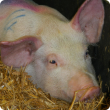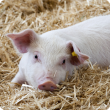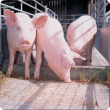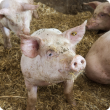Pigs
The Western Australian pork industry comprises 12% of the national pig herd worth approximately $130 million at the farm gate and employing some 1500 people along the supply chain. The majority of product is used as fresh pork for the domestic market, with 20% exported to Singapore. The industry capitalises on the strong availability of feed grains (barley, wheat and lupins), and while the majority of pigs are housed indoors, there is a growing proportion reared under extensive and straw-based systems.
In line with national and international trends, there is a continual consolidation of the industry with an increasing number of pigs now being grown under contract with the processing sector. The priority for the industry is to reduce the cost of production whilst improving product quality to meet the demand for premium pork products both locally and in many Asian countries. The Department of Primary Industries and Regional Development supports the industry in achieving this by conducting research activities in partnership with WA universities and private industry.
The department's Pork Innovation Group is involved in research in a variety of areas including nutrition, carcass quality, meat quality, improving the post weaning growth check, environment and housing.
Articles
Pages
- « first
- ‹ previous
- 1
- 2
- 3
Filter by search
Filter by topic
- Biosecurity & quarantine (16) Apply Biosecurity & quarantine filter
- Biosecurity (15) Apply Biosecurity filter
- Livestock biosecurity (14) Apply Livestock biosecurity filter
- Diseases (13) Apply Diseases filter
- Pests, weeds & diseases (13) Apply Pests, weeds & diseases filter
- Livestock health & diseases (12) Apply Livestock health & diseases filter
- Livestock management (11) Apply Livestock management filter
- Livestock disease surveillance (11) Apply Livestock disease surveillance filter
- Sheep (8) Apply Sheep filter
- Emergency animal disease preparedness (8) Apply Emergency animal disease preparedness filter
- Goats (8) Apply Goats filter
- Dairy cattle (8) Apply Dairy cattle filter
- Beef cattle (8) Apply Beef cattle filter
- Feeding & nutrition (7) Apply Feeding & nutrition filter
- Horses (6) Apply Horses filter
- Management & reproduction (5) Apply Management & reproduction filter
- Camelids (5) Apply Camelids filter
- Livestock movement & identification (4) Apply Livestock movement & identification filter
- Stockfeed (2) Apply Stockfeed filter
- Meat quality (2) Apply Meat quality filter
- Poultry & birds (2) Apply Poultry & birds filter
- Genetics & selection (2) Apply Genetics & selection filter
- Bees (2) Apply Bees filter
- Fungi (1) Apply Fungi filter
- Livestock research & development (1) Apply Livestock research & development filter
- Water (1) Apply Water filter
- Emergency response (1) Apply Emergency response filter
- Agribusiness Food & Trade (1) Apply Agribusiness Food & Trade filter
- Agricultural exports (1) Apply Agricultural exports filter
- Animal welfare (1) Apply Animal welfare filter
- Climate, land & water (1) Apply Climate, land & water filter






